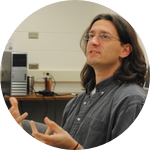About This Project
A more complete understanding of how a person's nervous system reacts to a session of massage therapy will help us uncover how massage reduces anxiety, depression, and pain. This could potentially improve the the delivery of massage therapy for treatment of those conditions.Ask the Scientists
Join The DiscussionWhat is the context of this research?
It is usually assumed that massage therapy reduces activity of the sympathetic nervous system - the branch responsible for the "fight or flight" response - and promotes activity of the parasympathetic nervous system - the branch responsible for the "rest and digest" response. However, there is only a small amount of scientific data that examines this. Further, the studies that have examined this have usually done so in the simplest manner, by taking measurements at the very beginning of treatment and again at the very end of treatment. As such, the ongoing, continuous response of the body to massage therapy is not known scientifically. A better understanding of how the autonomic nervous system responds to massage therapy moment-to-moment as it is occurring, and across the entire treatment session, will increase our understanding of this form of treatment and help us to answer important clinical questions such as:
How is massage able to reduce anxiety and depression?
How does massage help the body to recover faster from injuries and to cope with painful conditions?
How much massage is necessary to provide a therapeutic effect?
At what point in a session of massage therapy does the treatment begin providing maximal benefits in terms of autonomic tone?
Are there any aspects of massage therapy that tend to increase sympathetic nervous system activity and/or which decrease parasympathetic nervous system activity?
What is the significance of this project?
This research is important because it will refine our understanding of massage therapy, a therapeutic practice that is growing in popularity and for which there are well-documented positive clinical effects such as reduction of anxiety, depression, and pain.
This project is also important to me personally and in relation to my career. This study will help to inform the presentation I will be giving at the 2013 AMTA National Convention in September, and could also help me to compete for a new research position in the coming scientific and academic hiring season.
As the lead researcher and author of numerous massage therapy research studies, and the coeditor of the most up-to-date book on the integration of massage therapy research and practice, I am uniquely qualified to complete this research project.
What are the goals of the project?
The funds being requested are to ensure the completion of this project. Data collection for 60 sessions of massage therapy, which enabled collection of heart rate, heart rate variability, electrodermal response, and mood state, has already been completed under laboratory conditions. This data was collected while I was an assistant professor of psychology at a university in the upper Midwestern United States. A family health emergency caused me to leave that position before the data analysis and report writing could be completed. I am requesting funds which will allow me to complete this important study.
Budget
The requested funds will allow me to focus on data analysis, generation of scientific graphics, and completion of the final report for journal publication.
Meet the Team
Affiliates
Team Bio
I am a psychological scientist who uses a variety of methods (e.g., meta-analysis, clinical trials, psychophysiological and neuroscientific laboratory assessments, survey construction and administration, et al.), combined with and informed by clinical training and experience, to study when, for whom, and by what mechanisms massage therapy, the manual manipulation of soft tissue intended to promote health, wellness, and performance, can be beneficial. In addition to this main focus, I am also interested in studying other modalities, such as meditation, that involve self-regulation, both for their own sake and as a way to broaden my perspective for understanding massage therapy as an intervention.Christopher A. Moyer, Ph.D.
I am a psychological scientist who uses a variety of methods (e.g., meta-analysis, clinical trials, psychophysiological and neuroscientific laboratory assessments, survey construction and administration, et al.), combined with and informed by clinical training and experience, to study when, for whom, and by what mechanisms massage therapy, the manual manipulation of soft tissue intended to promote health, wellness, and performance, can be beneficial. In addition to this main focus, I am also interested in studying other modalities, such as meditation, that involve self-regulation, both for their own sake and as a way to broaden my perspective for understanding massage therapy as an intervention.
Additional Information
For access to all my prior studies of massage therapy and of meditation, please visit Psychradio.Project Backers
- 19Backers
- 115%Funded
- $810Total Donations
- $42.63Average Donation
